Good news for people
50 years of global immunisation
A new report estimates that since the 1970s, global immunisation efforts have saved an estimated 154 million lives—the equivalent of six lives every minute of every year. Vaccination against 14 diseases, including diphtheria, measles, polio, rubella, and tuberculosis, has helped reduced infant deaths by 40% globally and by more than 50% in Africa. Vox, WHO
Vaccines are among the most powerful inventions in history, making once-feared diseases preventable. Thanks to vaccines, smallpox has been eradicated, polio is on the brink, and with the more recent development of vaccines against diseases like malaria and cervical cancer, we are pushing back the frontiers of disease.
WHO Director-General, Dr Tedros Adhanom Ghebreyesus
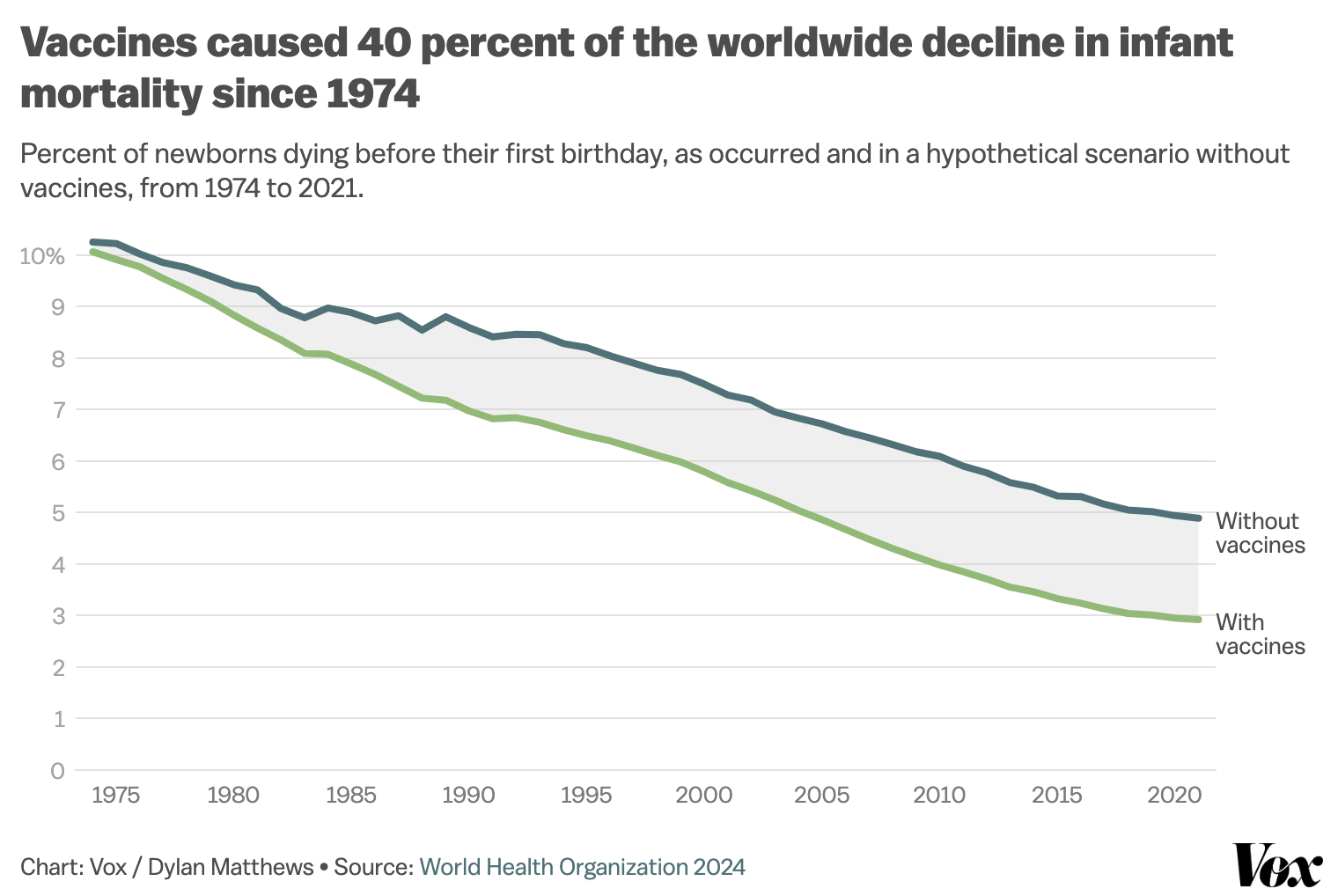
300 million people in Africa to get electricity by 2030
The World Bank and the African Development Bank have teamed up on an project that aims to halve the number of people without electricity through renewable energy systems and new distribution grids. Currently, 600 million Africans lack access to electricity, creating significant barriers to health care, education, jobs, and digital inclusivity. World Bank
Major step forward in rollout of malaria vaccines
Benin, Liberia, and Sierra Leone have launched their large-scale rollout of malaria vaccines, targeting millions of children across the three West African nations. The two vaccines—RTS,S and R21—will benefit around 200,000 children in Benin and 45,000 children in Liberia, and 550,000 doses will be delivered across Sierra Leone. WHO
Mosquito nets prevent 13 million malaria cases
Pilot studies have found an initiative that distributed 56 million second-generation bed nets across Burkina Faso, Benin, and Côte d’Ivoir potentially saved around 25,000 lives between 2019 and 2022. The nets were up to 50% more effective than traditional ones, reducing the risk of infection by up to 55%. Stat
Historic nursing home reform in the US sets staffing standards
The US is introducing a federal rule establishing minimum staffing levels in nursing homes, marking the most significant sector reform in decades and aiming to significantly improve care conditions. 'This is about dignity. This is about the dignity we, as a society, owe to those who care for the least of these.' The 19th
Significant milestone for LGBTQ rights in Dominica
Dominica's High Court has overturned a ban on consensual same-sex relations in the Caribbean island nation after a court ruled that the parts of the law that criminalised same-sex activity went against the country's constitution. 'The repeal of these discriminatory laws is a testament to the tireless efforts of activists, advocates, and allies who have long fought for justice and equality.' BBC

Maine signs transgender, abortion sanctuary bill
Maine has become the 16th state in America to explicitly protect trans and abortion care from prosecution. The bill, which faced a rocky road to passage, provides extensive protections against out-of-state investigations and adverse actions against medical providers. Washington Blade
US school meals to limit sugar
For the first time, the USDA has put a cap on added sugars in school meals. Starting in 2025, sugar will be limited in breakfast meals for 15 million students and lunch meals for almost 30 million students daily. Medical Daily
EU approves ruling to combat violence against women
The directive calls for stronger laws against cyberviolence, better assistance for victims, and steps to prevent rape. Under the new rules, female genital mutilation and forced marriage are prohibited, and they also establish guidelines for online offences like the disclosure of private information and cyberflashing. EU Parliament
EU to ban products made with forced labour
The European Parliament approved rules to ban the sale, import, and export of goods made using forced labour. If a product is deemed to have been made using forced labour, it will no longer be possible to sell it in the EU market and shipments will be intercepted at the EU's borders. Reuters
Gen Z are not doomed
While the popular view is that they will live grimmer, poorer lives than their elders, Gen Z are actually doing better than you think. Four-fifths of the world’s 12-to 27-year-olds live in emerging economies, and thanks to growth and technology, youngsters in places like Jakarta, Mumbai, and Nairobi are richer, healthier, and more educated than their parents. The Economist
Good news for the planet
Historic Indigenous conservation victory in British Columbia
Nearly half a million hectares of Crown land, including more than 200 islands of the Haida Gwaii archipelago, has been returned to the Haida Nation. It's the first time in Canadian history that the government has recognised Indigenous title across an entire terrestrial territory inclusive of land area as well as surrounding airspace, seabed, and marine waters. Hakai Magazine
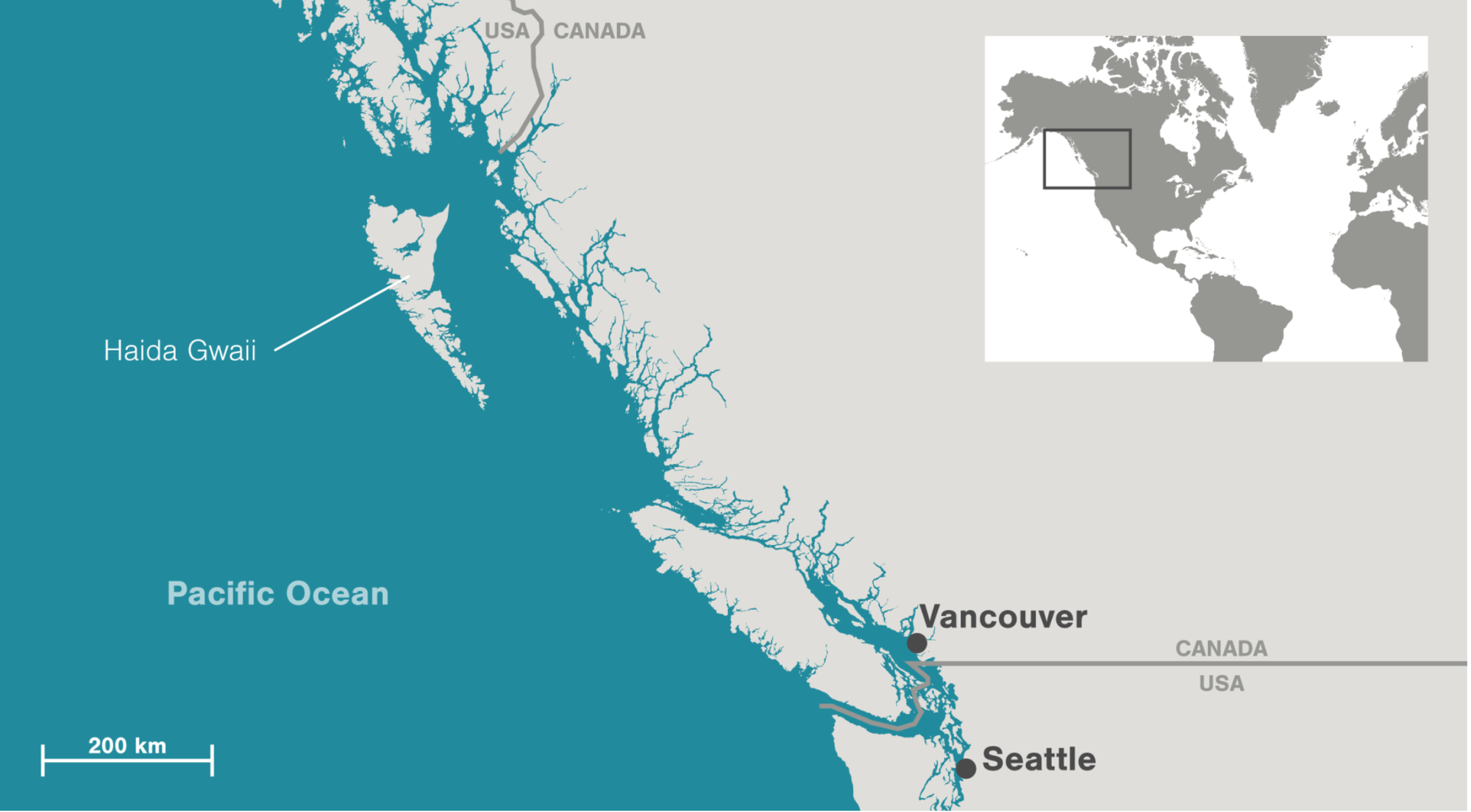
Big conservation news in Mongolia
The Eternal Mongolia initiative will invest $198 million over 15 years to help local communities safeguard 14.4 million hectares of Mongolia’s lands and waters, including intact grasslands, forests, deserts, wetlands, and rivers. The funding will also strengthen management of the country's 47 million hectares of already-protected areas. The Nature Conservancy
Huge land win in Australia
A Queensland cattle station the size of Yosemite National Park has been acquired for conservation after an anonymous donation of A$21 million. The 352,000 hectare property contains 34 ecosystems and is home to the endangered night parrot and vulnerable yellow-footed rock-wallaby. The Guardian
Ocean Conference raises $11.3 billion for marine conservation
Delegates at the Our Ocean Conference in Athens made 469 new commitments, with the host country making some of the biggest pledges to protect its oceans. Greece will establish two new MPAs in the Aegean and Ionian seas, ban bottom trawling in MPAs by 2026, and increase ocean monitoring and surveillance. Mongabay
Aquaculture in Thailand
Farming fish and shrimp together is one of the most common practices in polyculture farming in Thailand and is key to the future of its fishing industry. Integrated Multi-Trophic Aquaculture (IMTA) involves multiple organisms from different trophic levels being farmed together in a way complements one another, reducing waste and improving growth efficiency. Reasons to be cheerful

Peru's watershed moment for the 'right to a healthy environment'
After a 20-year legal battle, residents of La Oroya have won a landmark victory after an international court ruled that Peru was responsible for the 'physical and mental harm that a metallurgical facility’s pollution inflicted on 80 people.' The victims will be provided free medical care and over $30,000 compensation each. Inside Climate News
New EPA rules to slash pollution from power plants
The suite of new regulations includes rules that plants must control 90% of their carbon pollution, coal-fired plants have new emissions standards for toxic metals that are tightened by 67%, and pollutants discharged through wastewater must be reduced by more than 660 million pounds per year, ensuring cleaner water for affected communities. EPA
Brazil boosts mangrove protection
The state of Pará has established two new conservation reserves, adding 74,700 hectares to the world's largest and most-conserved belt of mangrove ecosystems. The progress is thanks to 13 years of advocacy by environmentalists and local communities. Mongabay
Good news for global tiger conservation
The Tiger Conservation Coalition will invest $1 billion to conserve tigers and tiger landscapes over the next ten years. In addition to securing and increasing the global tiger population, these funds will help expand tiger range, increasing overall biodiversity for the benefit of the local communities that share space with the species. WSC
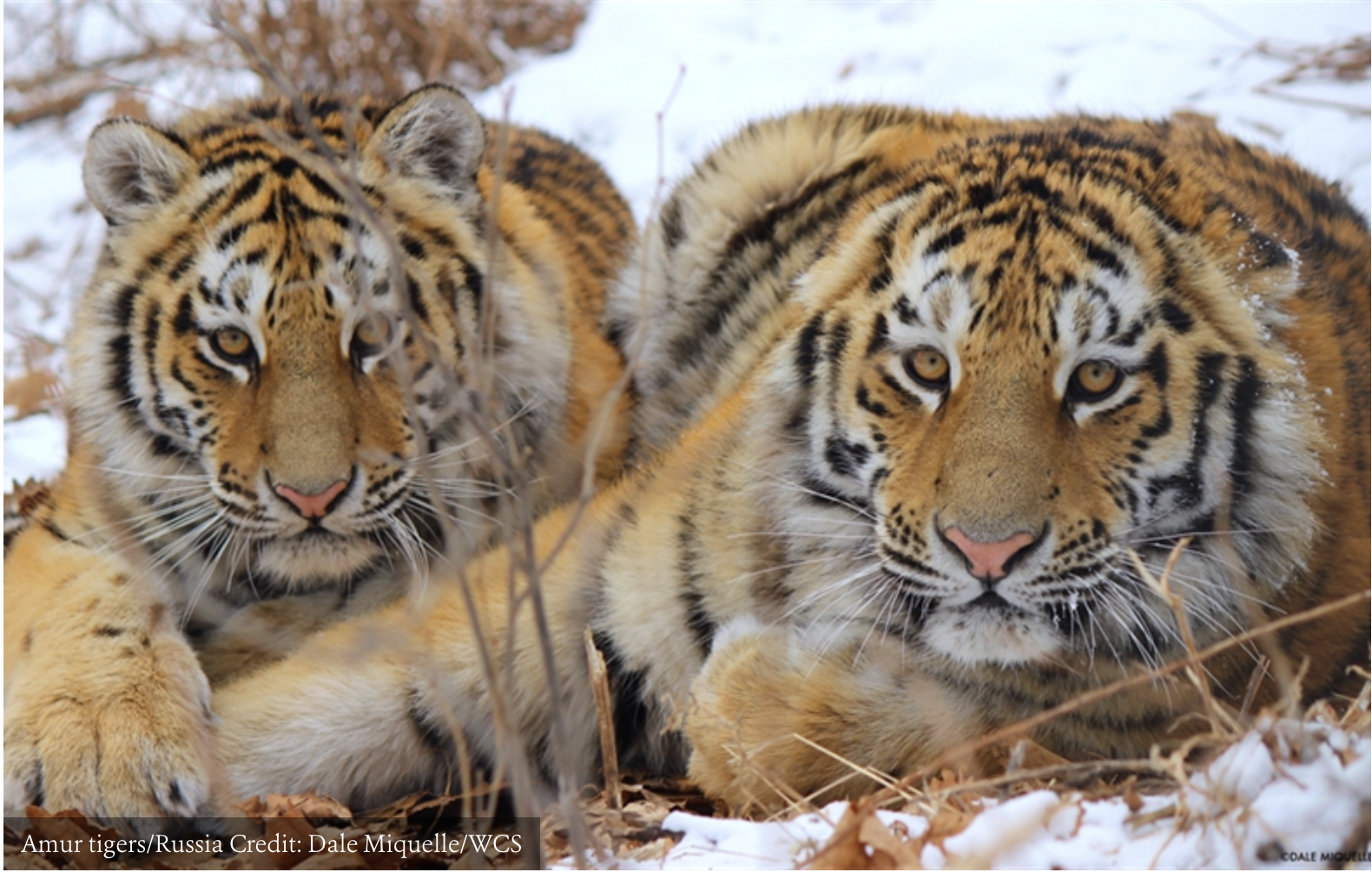
More music for those who will listen
Recordings of healthy fish are being transmitted to attract heat-tolerant larvae back to degraded reefs in the Maldives. Bangladesh is using satellite transmitters for saltwater crocodile conservation. The white-tailed eagle has bred in Belgium for the first time in 500 years. Scientists have finally pinpointed a fungal virus harming frogs and toads. Zambia has banned charcoal permits in three districts. Wet wipes containing plastic will be banned in the UK. Wellington’s biodiversity boom is bringing back the birds. Have you heard about the 'Green Islam' movement that is helping turn the tide on climate change?
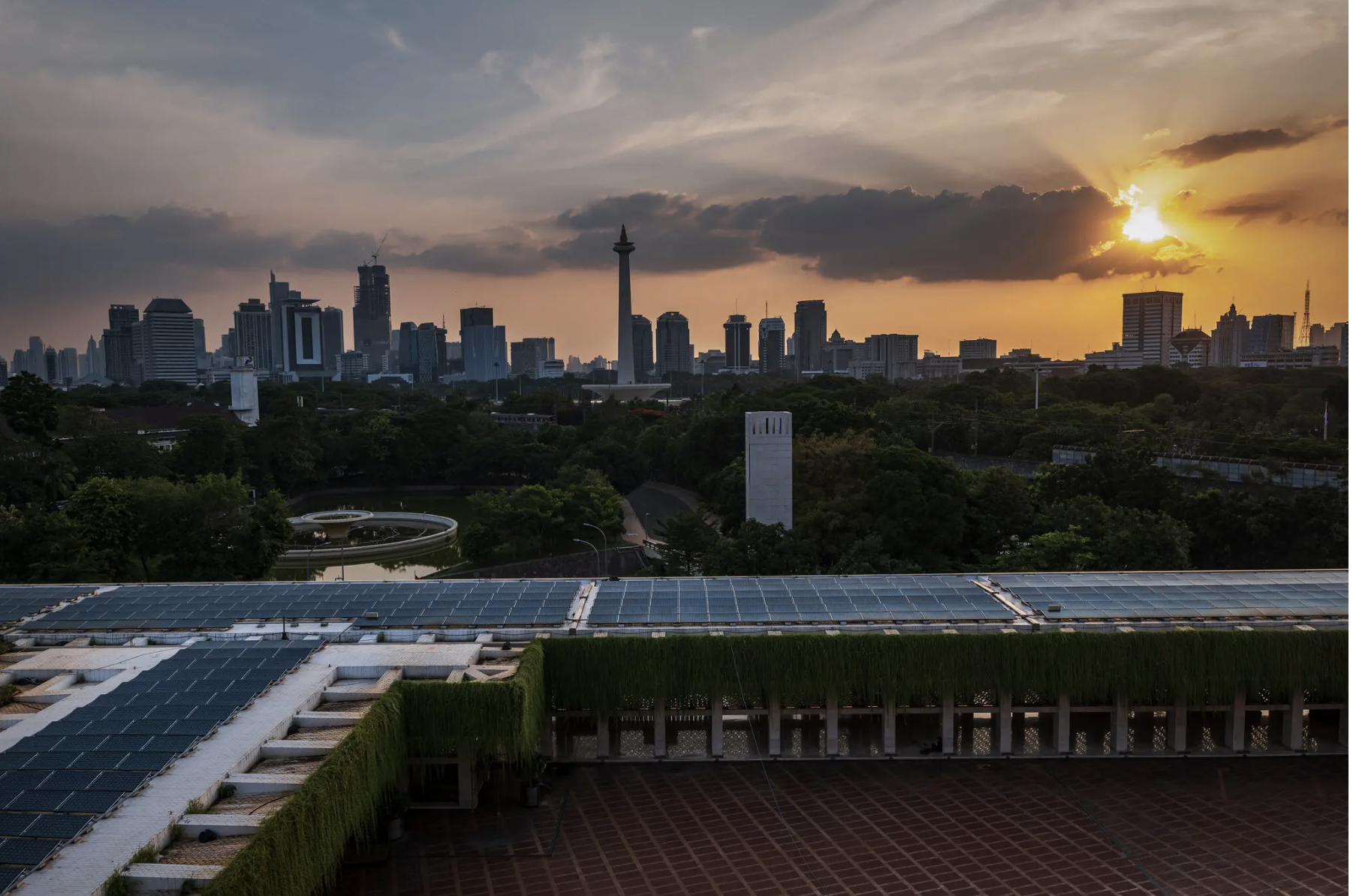
Saving the world is cheaper than ruining it
The most important climate news of the year—and there's still nobody reporting on it. China's solar additions in the first quarter of 2024 are up ~37% compared to the first quarter of 2023, and wind installations are up by around 50%. That puts China well ahead of its record pace last year. If this pace continues, global emissions will fall this year. Lauri Myllyvirta
Recent data from the China Passenger Car Association shows that electric vehicles constituted 50.39% of vehicle sales from April 1st to 14th, surpassing internal combustion engine vehicles for the first time. In March, the CEO of BYD, Wang Chuanfu, said he expected China to achieve that milestone in June. Car News China
No signs of an electric vehicle slowdown. Global EV sales grew 25% in the first three months of this year, and the IEA is saying total sales for the year are on track for around ~17 million. 'Rather than tapering off, the global EV revolution appears to be gearing up for a new phase of growth.' IEA

Electric vehicles continue to be doomed, this time with help from Honda and its $11 billion investment in new facilities in Canada to produce EVs for North America. The company will manufacture 240,000 vehicles a year at a new facility in Alliston, Ontario, a town north of Toronto. Bloomberg
'A cardinal fallacy reigns over the debate on green energy and global decarbonisation. It taps into deep Malthusian instincts and creates near universal confusion. [...] we will require just 40% to 45% of today’s total energy supply to replace the old system, and to lift the global South, and to satisfy the voracious demand of data centres, all at the same time. So rejoice.' Telegraph
In 2023, the number of nations above the 10% solar milestone doubled, and at least 29 countries installed more than 1 GW, up from 25 countries in 2022. Spain and the Netherlands became the first to reach 20%, and there are now 18 nations where solar produces more than 10%. IEA
Battery storage became the largest source of supply in California's grid for the first time on Tuesday, surpassing gas, hydro, nuclear, and renewables. The output of battery storage reached over 6 GW during the evening peak, marking a significant milestone in the state's transition to clean energy. Renew Economy
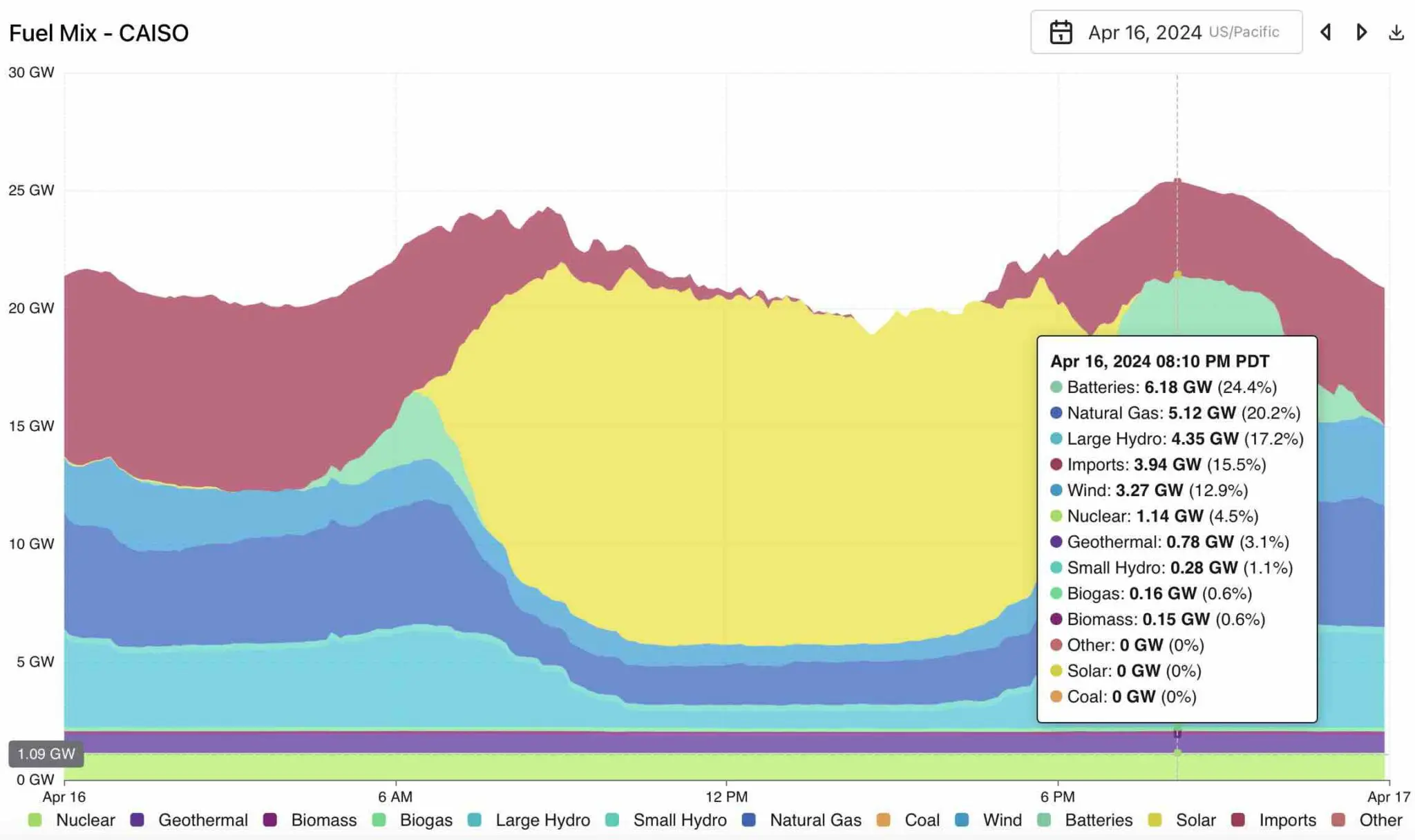
Meanwhile, the EIA predicts that the US will double battery storage in 2024. The battery storage boom will add 15.5 GW this year, and batteries will jump from 15.4 GW to 30.9 GW in 12 months. That, by the way, is way bigger than the AI demand 'surge' of ~18 GW by 2030 that's been reported ad nauseam in every news outlet for the last few weeks.
Over 900,000 households in low-income and disadvantaged communities in the US will be given free or low-cost rooftop solar panels or community solar access. The $7 billion investment will generate over $350 million in annual savings on electric bills for overburdened households and unlock four gigawatts of solar energy capacity for communities over five years. EPA
The Australian state of Queensland has passed historic legislation enshrining bold emissions reduction targets into law. The state aims to achieve 75% emissions reductions and 80% renewable energy generation by 2035. The laws also prioritise public ownership of energy assets and job creation in the renewable energy sector. AAP
Scotland just greenlit Europe's first commercial-scale floating wind farm. Called Green Volt, it will comprise 35 floating wind turbines with a capacity of 560 MW. It begins operations in 2029. This is a major milestone—the commercialization of floating wind technology, which opens up whole new areas of the planet for clean energy. Renewable Energy Magazine
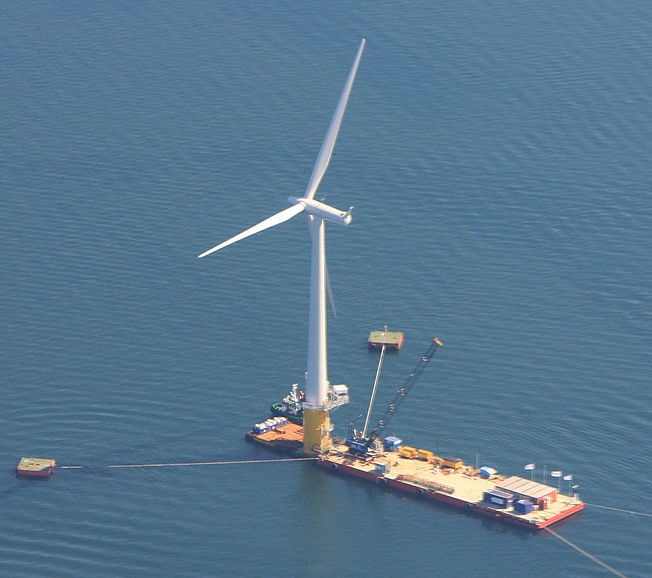
Indistinguishable from magic
Experts declare that insects and other animals have consciousness
A group of prominent biologists and philosophers have announced a new consensus: there’s 'a realistic possibility' that octopuses, cuttlefish, cleaner wrasse, zebra fish, bees, Drosophila fruit flies, and crayfish have what is known as 'phenomenal consciousness.' Quanta
Robotic heart surgery in Spain
For the first time, doctors in Barcelona have performed robotic heart surgery on teenagers with congenital heart disorders. Because the technique is less invasive, it reduces recovery time and aesthetic impact compared to open-heart surgery. Euro News
Scientists discover that light can vaporize water without heat
Researchers at MIT have discovered that light, not just heat, can cause water to evaporate. The astonishing new discovery, named the photomolecular effect, could revolutionize our understanding of water evaporation and lead to new applications in clean energy production and water desalination. MIT
Deepfake technology takes another giant step forward
We generally try to stay away from the relentless drumbeat of AI news, but this one is giving us some serious Philip K. Dick vibes and feels worth a mention. Microsoft has created an AI model that can generate an animated video of a person speaking or singing using just one high resolution photo and an audio track of their voice. Ars Technica
NASA announces six new missions
NASA is full speed ahead with six new aircraft-driven missions to study our changing planet. The projects will focus on arctic coastal change, weather created by wildfires, urban air pollution, impacts of changing weather patterns on landscapes, retreating glaciers, and agriculture. Space.com

Life-merging evolution could improve crop growth
Scientists have observed a rare evolutionary event in which two lifeforms merge into one, a process called primary endosymbiosis. To give some context, 'the last time this happened, Earth got plants.' Researchers have discovered that a species of algae has engulfed a cyanobacterium, resulting in a new organelle called a nitroplast. New Atlas
Massive Ichthyosaur discovered in Somerset, UK
A team of British palaeontologists discovered the remains of a giant Ichthyosaur with a jawbone measuring 2.3 meters, potentially making it the largest marine reptile ever, at 22-26 meters long. The study sheds light on the size and extinction of these ancient creatures. Ars Technica
The world's 'most dynamic humanoid robot'
After a decade of backflips, Boston Dynamics has retired Atlas, its original hydraulic robot, in favour of a new, all-electric version. The next-generation Atlas is a fraction of the size and weight of the previous version and has a greater range of movements thanks to 360° joints. ARS Technica
Global study maps 'family tree' of flowering plants
A new study by the Royal Botanic Gardens, Kew, has revealed the most comprehensive 'tree of life' for flowering plants. The research analysed genetic code from over 9,500 species, including specimens from 200-year-old herbarium collections, and sheds light on the rapid rise and diversity of flowering plants. Mongabay
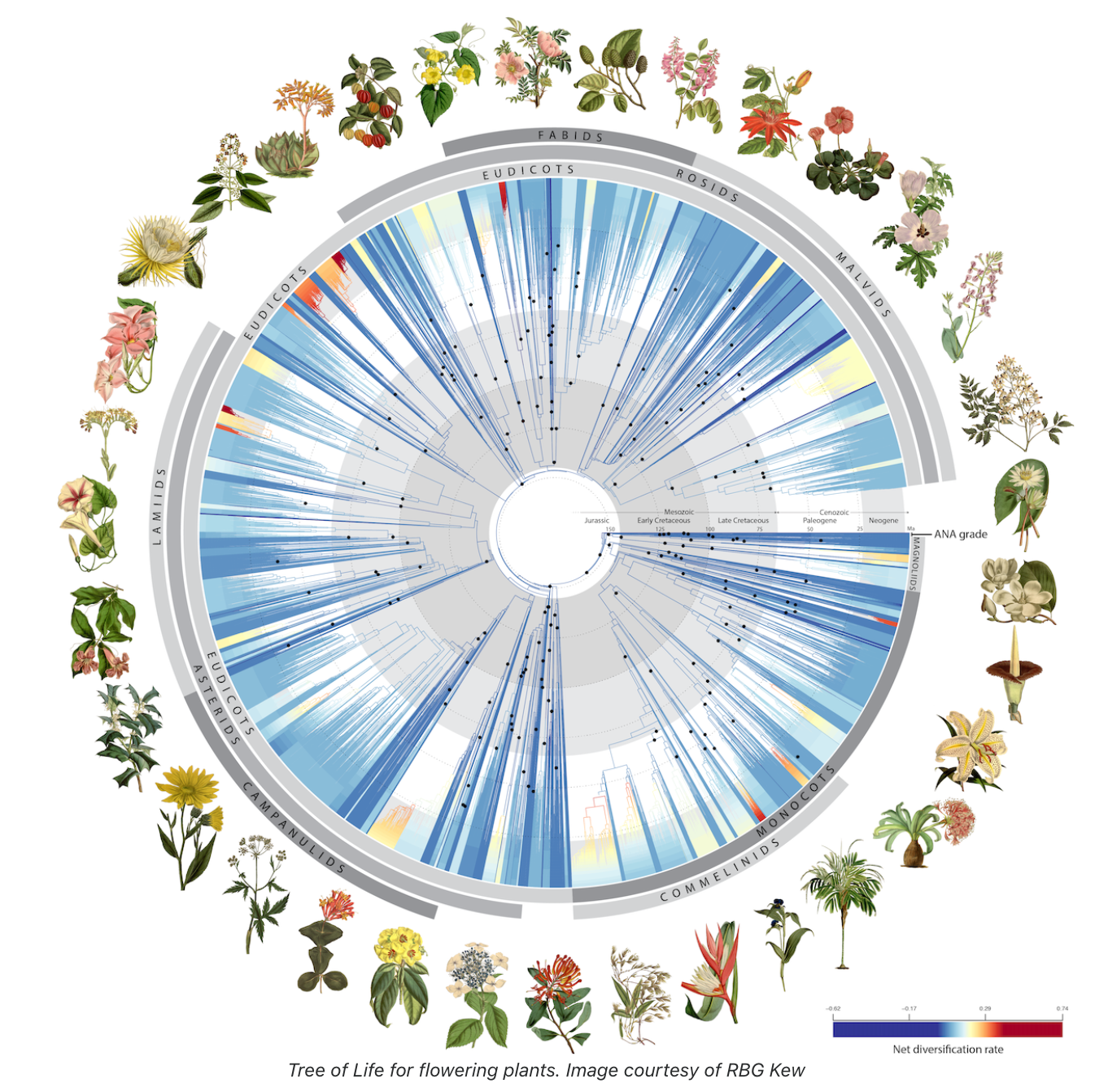
It's still an information superhighway
There's been a rise in books and television shows that offer a rosier vision of what a world past the throes of global catastrophe might look like. And there's a good reason for it. "The whole point of apocalyptic optimism is being optimistic in a way that actually helps get us somewhere. It’s not shiny and rosy and like cotton candy. It’s a bitter pill. But here we are and we can still do something." ' NYT
Here is the conversation that opened TED 2024. Palestinian peacemaker Aziz Abu Sarah and Israeli peacemaker Maoz Inon discuss the immeasurable tragedies they've experienced growing up in the region — and how they choose reconciliation over revenge, again and again.
Thanks for your patience everyone! Keep an eye out for our special charity edition, coming next. Until then, take care.
Much love,
Gus and Amy


